

University Inc.: The Corporate Corruption of Higher Education - Jennifer Washburn. JenniferWashburn University, Inc.: The Corporate Corruption of Higher Education. Tamiment Library & Robert F. Wagner Labor Archives. Search Jennifer Wasburn. ? Jennifer Washburn (JenWashburn) sur Twitter ? [video] Book Discussion on [University, Inc.: Corruption of American Higher Education] Jennifer Washburn, "University Inc." Uinc. Science's Worst Enemy: Corporate Funding.
Science's Worst Enemy: Corporate Funding. Merrill Goozner argues that the danger runs deeper.
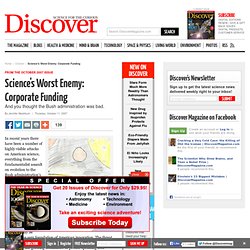
“In many precincts of the scientific enterprise, the needs of industry have become paramount,” he says, turning science into “a contested terrain” where facts are increasingly contingent on who is funding the research. “The whole scientific revolution, which was a product of the Enlightenment, is threatened when you commercialize science,” he warns. So is private funding a boon or a bane for American science? The answer, like good science itself, requires looking carefully at how the phenomenon is playing out in the real world. Steven Nissen is perhaps the most prominent physician speaking out about the pharmaceutical industry’s growing influence over medical research.
In the past, academic medical investigators strove to maintain “arm’s-length relationships with their corporate sponsors,” says Marcia Angell, a former editor in chief at The New England Journal of Medicine. The numbers bear Nissen out. Doctor Faust's office. Dr. Faust's Office. Academic Freedom & Corporate University. Jennifer Washburn: Academic Freedom and the Corporate University Commercial threats on campus have mounted—from industry control of research and corporate ghostwriting to restrictive sponsored-research agreements and intellectual property deals that place profits ahead of public health.
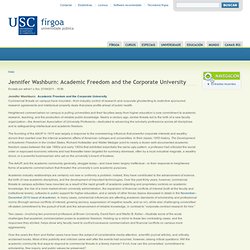
Heightened commercialism on campus is pulling universities and their faculties away from higher education’s core commitment to academic research, teaching, and the production of reliable public knowledge. Big Oil buys Berkeley. , to lead the largest academic-industrial research alliance in U.S. history.
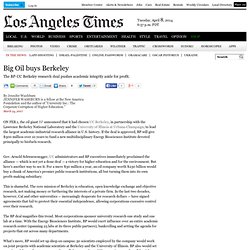
If the deal is approved, BP will give $500 million over 10 years to fund a new multidisciplinary Energy Biosciences Institute devoted principally to biofuels research. Gov. Arnold Schwarzenegger, UC administrators and BP executives immediately proclaimed the alliance — which is not yet a done deal — a victory for higher education and for the environment. But here's another way to see it. For a mere $50 million a year, an oil company worth $250 billion would buy a chunk of America's premier public research institutions, all but turning them into its own profit-making subsidiary.
This is shameful. The BP deal magnifies this trend. What's more, BP would set up shop on campus: 50 scientists employed by the company would work on joint projects with academic scientists at Berkeley and the University of Illinois. The fine print of the plan, which UC made public only after it was leaked, doesn't create much confidence. Report blasts universities' ties to oil companies - Sacramento News - Local and Breaking Sacramento News. The Kept University - Eyal Press and Jennifer Washburn. Commercially sponsored research is putting at risk the paramount value of higher education—disinterested inquiry.
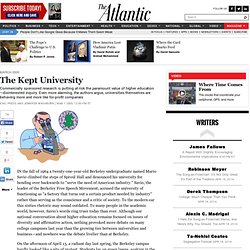
Even more alarming, the authors argue, universities themselves are behaving more and more like for-profit companies IN the fall of 1964 a twenty-one-year-old Berkeley undergraduate named Mario Savio climbed the steps of Sproul Hall and denounced his university for bending over backwards to "serve the need of American industry. " Savio, the leader of the Berkeley Free Speech Movement, accused the university of functioning as "a factory that turns out a certain product needed by industry" rather than serving as the conscience and a critic of society.
To the modern ear this sixties rhetoric may sound outdated. To many people in the academic world, however, Savio's words ring truer today than ever. The Kept University - School of Arts and Sciences. Interview with Jennifer Washburn. March 2005 Interview of Jennifer Washburn, author of the book, University Inc: The Corporate Corruption of Higher Education and New America Foundation fellow, by Nick Schwellenbach. Schwellenbach is a former member of the university watchdog group, University of Texas Watch (www.utwatch.org), and currently an investigator at the Project On Government Oversight (www.pogo.org). Can you tell us a little about your background? I've been a freelance journalist since 1995. Some years ago I received a grant from the Open Society Institute to research the growing privatization of various different areas of public life. The title of your book University, Inc. suggests that increasingly universities are acting like corporations themselves rather than simply having their research directed from the outside by corporations.
Yes, I try to make this point very clearly in the book. The goal of the legislation was quite noble: to transfer technology to industry more quickly. No. That's right. Corpwatch interview jennifer washburn. In 1998, the University of California at Berkeley struck a deal with Novartis, a Swiss agricultural-biotechnology firm (now called Syngenta), in which Novartis funded one-third of the research budget of a department within the university’s College of Natural Resources.
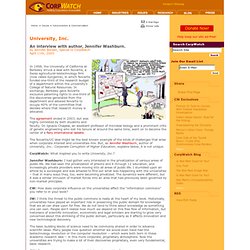
In exchange, Berkeley gave Novartis exclusive patenting rights to one-third of the discoveries generated from the department and allowed Novartis to occupy 40% of the committee that decides where that research money is allocated. The agreement ended in 2003, but was highly contested by both students and faculty. Dr. Ignacio Chapela, an assistant professor of microbial biology and a prominent critic of genetic engineering who lost his tenure at around the same time, went on to become the center of a fiery international debate. University, Inc.: The Corporate Corruption of Higher Education - Jennifer Washburn.